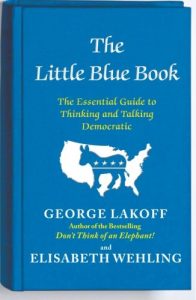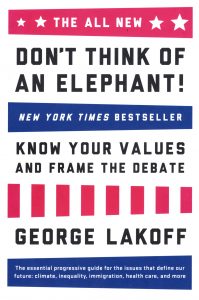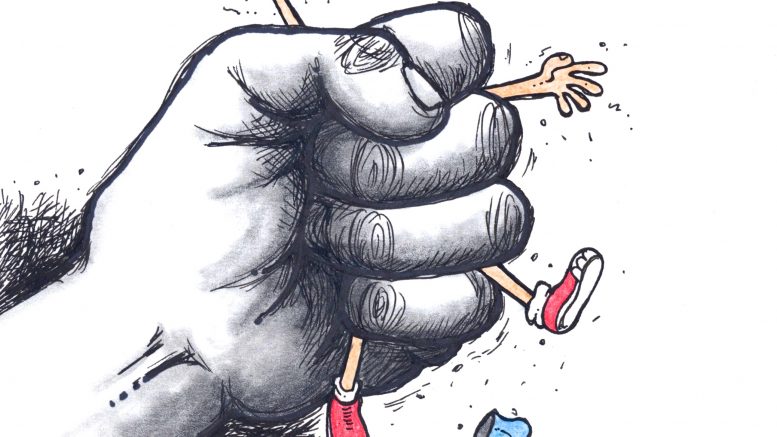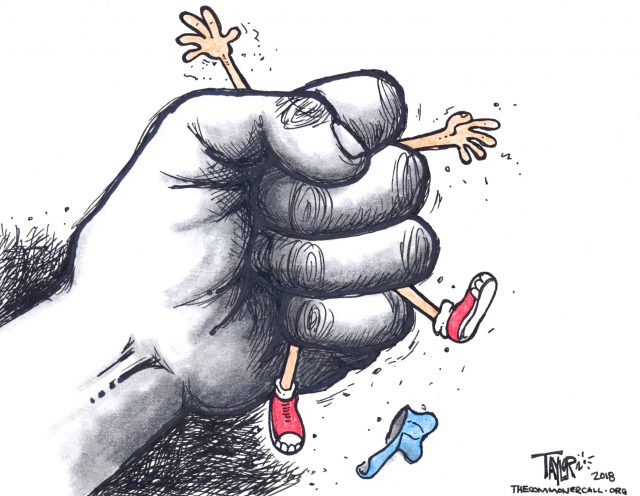“Men grow accustomed to poison by degrees.”
— Victor Hugo, Les Travailleurs de la Mer
By Mark L. Taylor
The Commoner Call (4/23/18)
As a political junkie and psychotherapist I get a lot of people asking me to explain just what the hell is going on with Donald Trump and his gang of misfit appointees and rabid fans. They want to know: Why does he say that?; Don’t his supporters realize he is going to make things worse for them?; I can’t believe what he just tweeted!; Why would anyone think that way?; He’s gonna’ change, right?”
I don’t know that I can answer the first bunch of questions but I can definitively answer that last one: No.
The key to the rise of Hitler and the transformation of the well-educated, sophisticated German society into a thuggish fascist state entranced by war had to do with Hitler’s instinctive understanding of the German family and — along with his propagandist Joseph Goebbels — a sophisticated understanding of how to bend and contort the language to make the heinous acceptable; patriotic even.
Once properly seen, Donald Trump is understandable. One can also see him as the pathetic husk that he is. And no, he is not going to change. We have to be active in resistance because if Trump and his gang win, we are all living in his family.
Linguist George Lakoff and Wisconsin campaign adviser and Lakoff associate Scott Wittkopf, of Frame For The Future, talk about the importance of emotional framing and how neuroscience has shown that 98% of all decision making is made emotionally through emotional frames, values and reference points. An example is the title of Lakoff’s best known book, “Don’t Think of an Elephant”.
Quick, what first popped into your mind’s eye when you read that title? That’s emotion-triggering framing at work in real time.
All politics is moral
Along with that is Lakoff’s observation that “all politics is moral”. Both right and left have moral reference schemes through which candidates, policies, the news and backyard political discussions with family and neighbors go through. Truly, when it comes to the initial and even long-term political responses, assumptions and actions that people take — how they vote, for example — it is through one’s emotional/moral neural architecture.
Smart as they are, fact-spouting democrats and the policy enamored left really don’t understand this. Republicans and conservatives — many of whom have business and marketing backgrounds — understand how it works and that’s how dismantling Social Security can be branded a “reform” and a reasonable concept of an inheritance tax on the super wealthy gets vandalized as a “death tax”. Notice your emotional — and even moral — reaction to those words: “reform” and “death tax”.
How about this: consumer “protections” vs consumer “regulations”. In the conservative frame of our culture “regulations” has an immediate, reflexive negative emotional frame and thus we see the Consumer Protection Bureau being systematically dismantled by republicans, with assistance from a few democrats, including Sen. Tammy Baldwin and Rep. Gwen Moore and Rep. Ron Kind voting with the right in favor of a Koch brothers-favored “balanced budget” amendment.
There’s another one “balanced budget” … notice your emotional reaction to the term.

But what is it that explains Trump’s and the republican party’s over-the-top, even gleeful acts of casual cruelty? How can anyone support forcibly separating immigrant children from their parents? Or deporting long-time residents with no criminal background from their American-born spouses and children? Why do republicans remain largely silent or at the most verbally mushy when it comes to condemning the rising tide of racial and ethnic harassment and violence?
Again, what are they thinking?
In Lakoff’s 2012 “The Little Blue Book: The Essential Guide To Thinking & Talking Democratic” he provides an insightful glimpse into the world view behind such republican routine cruelty. He turns to James Dobson, of “Focus On The Family” fame. In addition to his radio career, Dobson is also a psychologist who has published a raft of books. Lakoff includes excerpts from two of Dobson’s books — Dare to Discipline and The New Strong-Willed Child — in which Dobson articulates the authoritarian Strict Father Model:
“When a youngster tries this kind of stiff-necked rebellion, you had better take it out of him and pin is a marvelous purifier. … It is not necessary to beat the child into submission; a little bit of pain goes a long way for a young child. However, the spanking should be of sufficient magnitude to cause the child to cry genuinely.
“Two or three stinging strokes on the legs or buttocks with a switch are usually sufficient to emphasize the point, “You must obey me.”
“By learning to yield to the loving authority … of his parents, child earns to submit to other forms of authority which will confront him later n life — his teachers, school principal, police, neighbors and employers.
“Minor pain can … provide excellent motivation for the child. There is a muscle, lying snugly against the base f the neck … When firmly squeezed, it sends little messengers to the brain saying, “This hurts; avoid recurrence at all costs.”
“Real crying usually last two minutes or less, but may continue for five. After that point, the child is merely complaining. … I would require him to stop the protest crying, usually by offering him a little more f whatever caused the original tears.
“Spanking is inappropriate before 15 months of age and is usually not necessary until after 18 months.”
While Dobson may be a psychologist, he is not a good one. As Lakoff notes, there is plenty of research showing such brutal authoritarian parenting contributes to aggressiveness, low self-esteem, “…dependence on others, especially higher authorities, for moral guidance, standards, and limits…”. He also notes, “The study of spousal and child abuse shows an overwhelming correlation between abuse and strict father parenting.” (p. 50)
From numerous accounts of Trump’s relationship with his father, Fred, and his older brother Fred Jr’s relationship with the father, we see a very typical authoritarian model. A model that fits “hand-in-mailed-glove” with the current authoritarian White House and republican party world view.
“The result is that the harm inflicted on children in the family is spread throughout our nation and the world,” Lakoff notes (p.52).
Lakoff identifies the progressive empathetic family as the counter in which children are seen as unique and deserving of nurturing. Children have rights but because they don’t have equal responsibility, the parents are in charge of the home but with the best interest and care of the child in mind. Imagine a politics based on such a moral reference.
Daddy’s not happy
Looked at from this strict father perspective, recent administration efforts to limit speech and rein in protest and militarize the voting process (sign the petition) makes perfect sense. So, too talk of jailing troublesome reporters to be raped. Perfect sense that is if, you are an authoritarian misanthrope with self-esteem issues leading you to hurting others to try and feel better about yourself.
Once properly seen, Donald Trump is understandable. One can also see him as the pathetic psychological husk that he is. And no, he is not going to change. Donald Trump is the man he is and the Russpublicans are the party they have become.
We have to be active in resistance because, if Trump and his gang win, we will all be living in his family.

(Commoner Call story and cartoon by Mark L. Taylor, 2018. Open source and free for non-derivaive use with link to www.thecommonercall.org )


